A New Black Monday
Markets are plunging. Oil prices in a tailspin. Nations are shutting down. The spectre of a recession has arrived at our doorsteps. The catalyst for all these cataclysmic developments boils down to one virus: covid-19. In just a few short weeks, the deadly flu virus had killed thousands, infected thousands more, and inflicted widespread economic damage. The pace of globalisation has ground to a halt.
In these volatile days, investors only trust a few things: bonds and gold. In the US, the 10-year yield touched 0.5% – its lowest yield ever. This stampede is clearly marked on TLT (see below). Meanwhile, Gold, VIX, and the Japanese Yen are staying elevated as investors flock to haven assets.
On Monday (March 9), the US stock market even stopped trading for a while as investors dumped stocks indiscriminately. The picture of empty shelves and mass quarantine truly melted investor confidence.
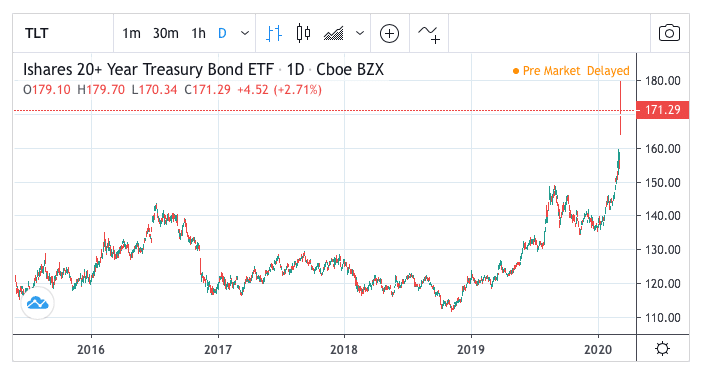
Master investor Jim Mellon has put out a flash note that advised readers to:
- Stick with gold and silver. Going higher.
- Dollar is broken down; go long sterling dollar.
- If by any remote change the FANGS have a bounce, short or sell them.
- Dip a toe into the travel sector. IAG in UK and Delta in US v good.
- I think US interest rates are probably over discounting the worst. If you are brave, short the long end of the US bond market.
- Short VIX.
I concur with most of them, although shorting instruments would be very high risk due to the sharp increase in market volatility!
Crisis = Opportunity?
A crisis, wisely used, can also be an opportunity. While I am not underestimating the economic damage from this epidemic, but it is clear that some parts of the asset market may present opportunities for nimble investors. The reason is that investors are de-risking wholesale disregarding fundamentals.
Moreover, not every stock will be impacted by the epidemic equally. Let me quote these relevant passages from Buffett’s letter to shareholders 23 years ago! (1987):
Ben Graham, my friend and teacher, long ago described the mental attitude toward market fluctuations that I believe to be most conducive to investment success. He said that you should imagine market quotations as coming from a remarkably accommodating fellow named Mr. Market who is your partner in a private business. Without fail, Mr. Market appears daily and names a price at which he will either buy your interest or sell you his.
Even though the business that the two of you own may have economic characteristics that are stable, Mr. Market’s quotations will be anything but. For, sad to say, the poor fellow has incurable emotional problems. At times he feels euphoric and can see only the favorable factors affecting the business. When in that mood, he names a very high buy-sell price because he fears that you will snap up his interest and rob him of imminent gains. At other times he is depressed and can see nothing but trouble ahead for both the business and the world. On these occasions he will name a very low price, since he is terrified that you will unload your interest on him.
Mr. Market has another endearing characteristic: He doesn’t mind being ignored. If his quotation is uninteresting to you today, he will be back with a new one tomorrow. Transactions are strictly at your option. Under these conditions, the more manic- depressive his behavior, the better for you.
In my opinion, investment success will not be produced by arcane formulae, computer programs or signals flashed by the price behavior of stocks and markets. Rather an investor will succeed by coupling good business judgment with an ability to insulate his thoughts and behavior from the super-contagious emotions that swirl about the marketplace.
Well, in the morning hours of Monday morning prices of Royal Dutch A (RDSA) was quoted at 1,280p. A mere 24 hours later, the new quotation is 1,450p, a change of 13%!
It appears that Mr Market has flipped out and turned manic depressive. Mr Buffett has suggested repeatedly that you use its temperamental and volatile nature to your advantage.
Current Correction will Result in New Leadership
During a long bull market, like what the US stock market is having now, there will be several sector rotations along the way. These rotations were typically initiated around corrections.
For example, in the early parts of the bull run (2009-’10), financials provided the best returns because they were deeply oversold. Then material stocks took over after the Flash Crash in 2010 – a run that ended after gold peaked in August 2011. After 2015, technology stocks assumed leadership, led famously by FAANGS. A series of speculative stocks took centre stage. In 2018, it was Netflix (NFLX). In 2019, it became Tesla (TSLA).
The current correction will be no different. When this is over, new market leadership will emerge.
Poring over the UK market, there are some of my observations:
One, the latest correction has led to a massive selloff in many long-running downtrends. Is this the classic final-phase, climactic decline? For example, look at BT Group (BT.A). Prices were trading at 500p in 2015. Now, shares are changing hands at 122p, a drop of nearly 75 percent! At this rate of decline, either its equity value will vanish completely or the cyclical bear trend is near a base. Many other UK stocks are exhibiting such sharp declines as well.
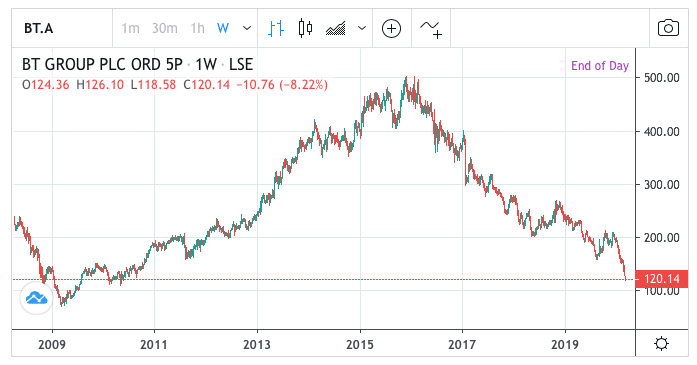
Two, the travel industry is massively oversold. This is due to the severe cutoffs in human travelling. While I am not ruling out potential bankruptcies in this sector as revenue dries up, once the epidemic is controlled, the travel sector (cruise, airlines, hotels) is likely lead the rebound as financials did in 2009. A dip here may be a counter-trend thing to do, but the potential reward may compensate for the risk.
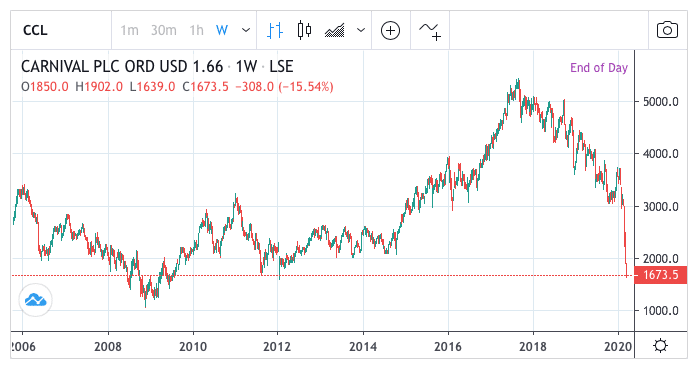
Three, will China lead the stock market post covid-19 crisis? Note that China was the first to quarantine cities. Now it is the first to emerge. The epicentre of covid19 – Wuhan, China – is now dismantling its temporary hospitals as new cases shrink. The current leadership will do everything it can to normalise economy activities to make up the lost ground. In other words, the gov will be running highly stimulative fiscal and monetary policies in the months ahead – policies that are likely to favour asset prices.
Note the relative strength exhibited by some of the Chinese funds like Fidelity China Special (FCSS). I would not be surprised if the fund actually hit new long-term highs in the weeks ahead.
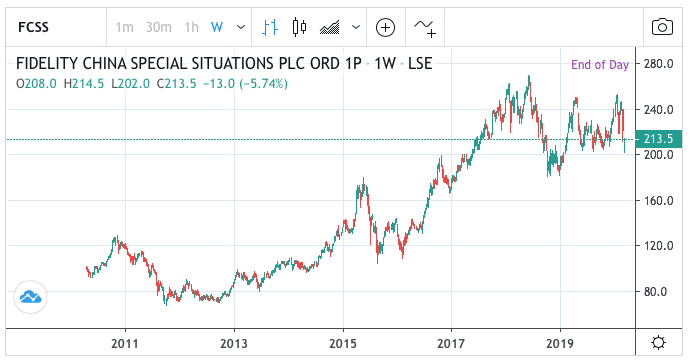
Four, some stocks are weathering the epidemic well. For example, companies that are facilitating remote working. Zoom Video (ZM) in the US is one good example. Its share price has bucked the general weak market trend (see below). In the UK, some say that BATM (BVC) has the potential.
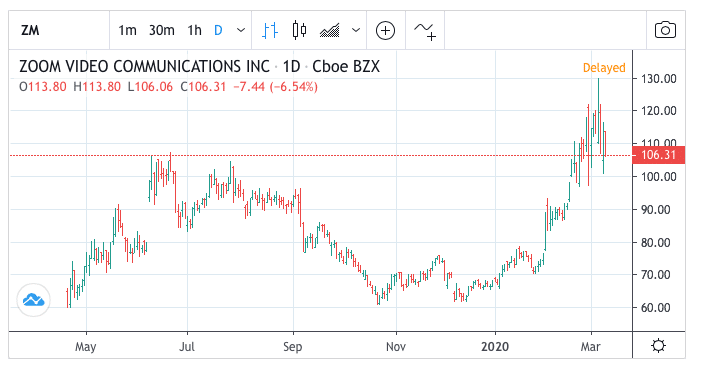
In conclusion, the current/future corrections may present investors with some opportunities to build long-term buy positions. Given that covid-19 crisis is just emerging in Europe, you may take ‘baby buy positions’ every time market goes south in a panic. Setup a watchlist. Review them as events unfold. Be prepared in advance – and be greedy when others are fearful.

Jackson is a core part of the editorial team at GoodMoneyGuide.com.
With over 15 years of industry experience as a financial analyst, he brings a wealth of knowledge and expertise to our content and readers.
Previously, Jackson was the director of Stockcube Research as Head of Investors Intelligence. This pivotal role involved providing market timing advice and research to some of the world’s largest institutions and hedge funds.
Jackson brings a huge amount of expertise in areas as diverse as global macroeconomic investment strategy, statistical backtesting, asset allocation, and cross-asset research.
Jackson has a PhD in Finance from Durham University and has authored over 200 guides for GoodMoneyGuide.com.
To contact Jackson, please see his Invesdaq profile.

